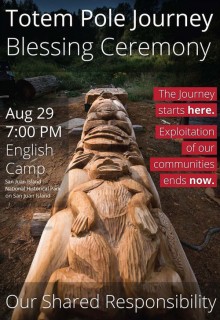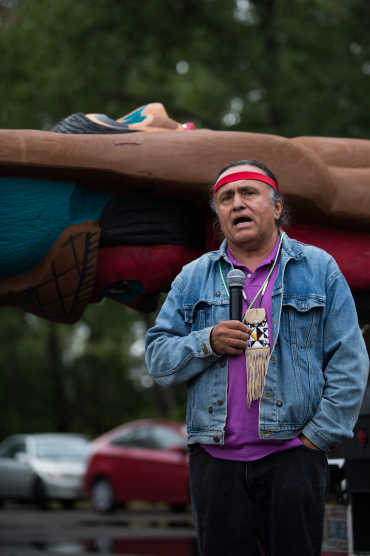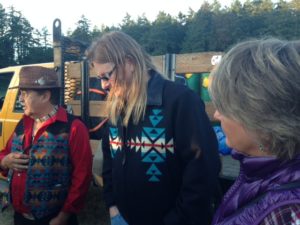Totem Pole Journey Blessing Ceremony
Home » Articles and News » Totem Pole Journey Blessing Ceremony
by Paul Robear
Totem Pole Journey Blessing Ceremony comes to San Juan Island
 On Friday, August 29th, 2014 Laura and I attended a Totem Pole Journey Blessing Ceremony conducted by the Lummi Nation Elders here near our home on San Juan Island. The Lummi Nation brought a specially carved totem poles to San Juan Island to bring awareness to a proposed coal terminal to be built on a 3500 year old ancestral village site. This ceremony was in support of the Lummi Nation efforts to stop the Gateway Pacific coal terminal and fossil fuel exports that threaten sacred tribal land and water. In addition to speaking to raise awareness of this threat, Lummi Nation Elder Douglas James, also shared sacred songs and prayers. One of the main themes of the evening was it is time to “Warrior Up”!
On Friday, August 29th, 2014 Laura and I attended a Totem Pole Journey Blessing Ceremony conducted by the Lummi Nation Elders here near our home on San Juan Island. The Lummi Nation brought a specially carved totem poles to San Juan Island to bring awareness to a proposed coal terminal to be built on a 3500 year old ancestral village site. This ceremony was in support of the Lummi Nation efforts to stop the Gateway Pacific coal terminal and fossil fuel exports that threaten sacred tribal land and water. In addition to speaking to raise awareness of this threat, Lummi Nation Elder Douglas James, also shared sacred songs and prayers. One of the main themes of the evening was it is time to “Warrior Up”!
The totem pole is one of the oldest forms of North American storytelling. Today, it still serves to remind us of our place within nature, our responsibility to future generations, and our connections to each other and to our communities.
Lummi Nation Elder and Master Carver of House of Tears Carvers Jewell James carved the Totem Pole shared the passion of his tribal people to protect the sacred water and land of his ancestors. He spoke of communities whose culture and livelihoods are threatened by coal, Bakken oil and tar sands oil exports. The total trip of the the totem pole journey extends 2,500 miles from Minneapolis, MN, west to Friday Harbor, San Juan Island, WA, and finally northeast until it reaches Peace River, in the heart of Alberta tar sands territory.
Here is a letter from Jewell Jones:

“In August we make our journey from South Dakota to the Salish Sea and north to Alberta, Canada, stopping with many of the tribal and local communities whose lives unwillingly intersect with the paths of coal exports and tar sands. We will carry with us a 19-foot-tall totem that brings to mind our shared responsibility for the lands, the waters and the peoples who face environmental and cultural devastation from fossil fuel megaprojects. We travel in honor of late elder, and leader, and guiding light Billy Frank, Jr., who would remind us that we are stewards placed here to live with respect for our shared, sacred obligation to the creation, the plants and animals, the peoples and all our relations. He guides us, still. Our commitment to place, to each other, unites us as one people, one voice to call out to others who understand that our shared responsibility is to leave a better, more bountiful world for those who follow.
For generations, tribal peoples have witnessed the impact of faceless “persons” — corporations — on the land, water, air and human and environmental health. Though at times consulted, we have not been heard as a real voice in defending our traditional homeland territories. Instead, we have seen and experienced degradation of environmental integrity and destruction of healthy ecosystems. We suffered as our traditional foods and medicines were lost, and our people’s health plunged.
The Lummi, the Affiliated Tribes of Northwest Indians, and all Coast Salish tribes, face devastating proposals that would bring coal by rail from Montana and Wyoming to the West Coast for export overseas. Indeed, the Cherry Point (in our language, Xwe’chi’eXen) proposal poses a tremendous ecological, cultural and socio-economic threat to Pacific Northwest tribes.
Xwe’chi’eXen is a 3,500-year-old village site where many of our ancestors lived and made their final resting places. Today, 60 percent of Lummis have direct ancestral ties to this site. Around it, the Salish Sea supports a Lummi fishing fleet (450 vessels) that feeds and supports tribal families.
Coal exports threaten all of this. We fear the desecration of Xwe’chi’eXen, the first archaeological site to be placed on the Washington State Register of Historic Places. We wonder how Salish Sea fisheries, already impacted by decades of pollution and global warming, will respond to the toxic runoff from the water used for coal piles stored on site. How will Bellingham’s recreational and commercial boaters navigate when more than 400 cape-sized ships, each 1,000 feet long, depart Cherry Point annually — each bearing 287,000 tons of coal? What will happen to the region’s air quality as coal trains bring dust and increase diesel pollution? And of course, any coal burned overseas will come home to our state as mercury pollution in our fish, adding to the perils of climate change.
Already, coal export officials have shown breathtaking disrespect for our heritage. To save time and boost profits, Pacific International Terminals bulldozed what they knew to be a registered archaeological site and drained our wetlands without a permit.
This proposal is not based on economic necessity. The inflated number of jobs promised is an old, old story; one filled with promises made, and broken. At the end of the day there would be far fewer jobs created and many sustainable jobs lost or compromised. The defeat of this madness is our aboriginal duty as the first Americans, but it also speaks to the collective interest of all citizens and — most importantly — as members of the human family who are part of, not masters over, creation. But this is a new day.
To those who would sacrifice the way of life of all peoples of the Pacific Northwest, we say: Take notice. Enough is enough! This summer’s proposed changes to the site design are beside the point. Mitigation is not the issue. We will stop the development of the export terminal and put in its place a plan that honors our shared responsibility to the land and waters of Xwe’chi’eXen and all our relations.
In August we make our journey from South Dakota to the Salish Sea and north to Alberta, Canada, stopping with many of the tribal and local communities whose lives unwillingly intersect with the paths of coal exports and tar sands. We will carry with us a 19-foot-tall totem that brings to mind our shared responsibility for the lands, the waters and the peoples who face environmental and cultural devastation from fossil fuel megaprojects. We travel in honor of late elder, and leader, and guiding light Billy Frank, Jr., who would remind us that we are stewards placed here to live with respect for our shared, sacred obligation to the creation, the plants and animals, the peoples and all our relations. He guides us, still. Our commitment to place, to each other, unites us as one people, one voice to call out to others who understand that our shared responsibility is to leave a better, more bountiful world for those who follow.”
It was a inspirational evening and by the end no one was in doubt that the tribal people are the original environmentalist. They spoke with a power, confidence and a down to earth common sense. Laura and I left feeling inspired and empowered to stand up to protect our environment …. or as the Lummi say, to Warrior Up.
Here is a letter from the chairman of the Lumni tribe, Timothy Ballew II.
Website http://totempolejourney.com/


Home » Articles and News » Totem Pole Journey Blessing Ceremony
